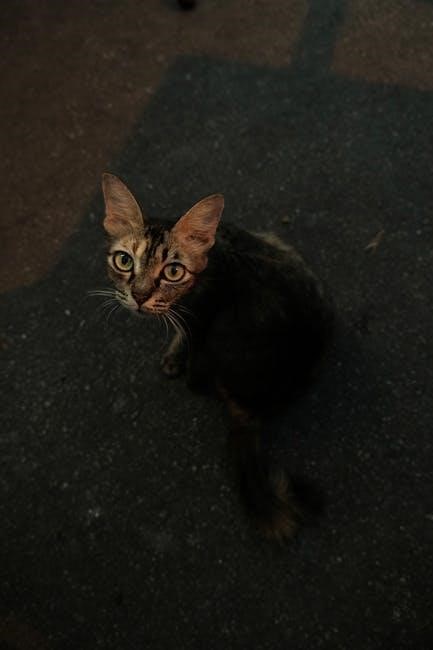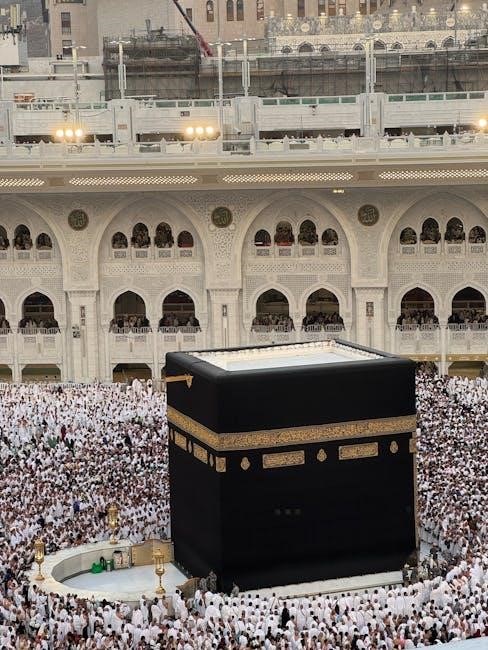
Night Chapter 4 explores Eliezer’s harrowing experiences in a concentration camp, delving into themes of survival, faith, and dehumanization․ The chapter vividly portrays the emotional and psychological struggles faced by Eliezer and other prisoners, highlighting the harsh realities of life under Nazi rule․ Through haunting imagery and poignant reflections, Wiesel captures the loss of hope and the fight to maintain humanity in the face of unimaginable suffering․ This section provides a deeper understanding of the Holocaust’s impact on individuals and communities, offering insights into resilience and despair․
Overview of the Chapter
Night Chapter 4 depicts Eliezer’s brutal experiences in a concentration camp, focusing on the dehumanizing conditions and the struggle for survival․ The chapter begins with Eliezer’s arrival at a new camp, where he is struck by its eerie silence and desolation․ Key events include a dental examination where the dentist seeks gold teeth, Eliezer’s task of sorting electrical parts, and his encounter with the unstable Kapo, Idek․ The chapter also explores Eliezer’s emotional turmoil, his beating by Idek, and his growing sense of despair․ These events underscore the loss of humanity and the psychological toll of the Holocaust․
Historical Context
Night Chapter 4 is set during the Holocaust, a period of unimaginable suffering orchestrated by the Nazis․ The concentration camps, like Auschwitz and Buna, were central to Hitler’s plan to exterminate Jews and other minorities․ Prisoners endured forced labor, starvation, and brutal treatment, reflecting the dehumanizing ideology of the Third Reich․ The chapter highlights the systematic degradation of human dignity, as prisoners were reduced to mere labor tools; The historical context underscores the atrocities committed and the psychological impact on survivors, providing a chilling glimpse into one of history’s darkest chapters․
Key Themes and Motifs
Night Chapter 4 delves into themes of faith, survival, and dehumanization․ Eliezer’s struggle with his belief in God intensifies as he witnesses unbearable suffering, questioning divine justice․ The motif of death and betrayal is prominent, as prisoners are forced to confront their own mortality․ The loss of humanity is underscored through the brutal treatment of inmates, while the will to survive emerges as a recurring motif․ The chapter also explores the psychological impact of trauma, highlighting the moral and ethical dilemmas faced in extreme conditions․ These themes and motifs vividly illustrate the Holocaust’s devastating effects on individuals and communities․

Plot Summary of Chapter 4
Eliezer and his father endure harsh conditions in a concentration camp, facing a dentist seeking gold teeth and brutal Kapo Idek․ Elie avoids dental extraction by feigning illness and endures Idek’s violence․ The hanging of a young pipel deeply disturbs him, symbolizing the camp’s cruel reality․ The chapter underscores the dehumanization and loss of hope amidst constant suffering․ The struggle to maintain humanity is evident, highlighting the emotional and psychological toll of their experiences․
Setting and Atmosphere
The setting transitions to a concentration camp, where Eliezer and his father face brutal conditions․ The camp is described as deserted and lifeless, with an eerie atmosphere of dread․ The factory and barracks serve as stark reminders of their dehumanization․ The dentist’s search for gold teeth and the unpredictable violence of Kapo Idek heighten the tension․ The hanging of a young pipel creates a somber mood, emphasizing the camp’s merciless environment․ Darkness and despair permeate the narrative, evoking a sense of hopelessness and the erosion of humanity․ The atmosphere is oppressive, reflecting the prisoners’ emotional and psychological torment․
Major Events and Turning Points
In Chapter 4, Eliezer faces a pivotal moment when a dentist examines prisoners for gold teeth, and Eliezer fears losing his crown․ He pretends illness to avoid extraction, showcasing his desperation to retain dignity․ The unpredictable Kapo Idek violently beats Eliezer at the factory, highlighting the constant fear of arbitrary cruelty․ A turning point occurs during the hanging of a young pipel, which deeply disturbs Eliezer, unlike previous hangings․ This event underscores the dehumanizing environment and the moral decay of the camp, profoundly affecting Eliezer’s emotional state and views on survival․
Character Development
In Chapter 4, Eliezer’s character evolves as he faces moral dilemmas and physical suffering․ His fear of the dentist and decision to feign illness reveal his desperate struggle to retain dignity․ The violent encounter with Idek further erodes his faith in humanity․ Supporting characters like the dentist and Idek highlight the camp’s brutality, while the Youth of Warsaw inspire fleeting hope․ These interactions deepen Eliezer’s emotional turmoil, showcasing his resilience and internal conflict amidst unimaginable horrors․
Study Questions and Answers
Chapter 4 sparks critical thinking about Elie’s experiences, moral dilemmas, and emotional responses․ Questions like “Why was the dentist searching for gold teeth?” and “How did Elie avoid losing his crown?” encourage deeper analysis of the characters’ struggles and the camp’s brutal environment․ These inquiries help readers connect with the themes of survival, faith, and the erosion of humanity, fostering a greater understanding of Elie’s journey and the Holocaust’s profound impact․
Direct Questions from the Chapter
- What was Elie’s first impression of the new camp at Buna?
- Why did the dentist examine the prisoners’ mouths?
- What excuse did Elie give to avoid losing his gold crown?
- Describe the task Elie and his father were assigned․
- Why was the Kapo, Idek, considered a potential problem?
- What happened to Elie during the factory incident with Idek?
- How did Elie feel about the hanging of the young pipel?
These questions directly address key events and details from Chapter 4, providing a foundation for understanding Eliezer’s experiences and the camp’s harsh realities․
Reflective and Analytical Questions
- How does Eliezer’s perception of humanity evolve after witnessing the hanging of the young pipel?
- What role does fear play in the prisoners’ behavior and decision-making?
- Analyze the significance of Eliezer’s relationship with his father in the context of survival․
- How does the presence of the dentist and the search for gold teeth highlight the dehumanization of prisoners?
- What does the atmosphere of the factory reveal about the psychological state of the workers?
- Reflect on the moral dilemmas faced by prisoners and how they cope with them․
These questions encourage a deeper exploration of the chapter’s emotional and ethical complexities, fostering critical thinking and analysis․
Analysis of Themes
The chapter delves into themes of death and suffering, loss of faith, and dehumanization, highlighting the psychological toll of concentration camp life on Eliezer and fellow prisoners․
The Tone Regarding the Youth of Warsaw
The tone regarding the Youth of Warsaw in Night Chapter 4 is one of awe, respect, and pride․ Their resilience and defiance in the face of Nazi oppression inspire hope and admiration․ Eliezer marvels at their ability to maintain dignity and spirit, even in the midst of unimaginable suffering․ The Youth of Warsaw symbolize resistance and the unbroken human spirit, contrasting sharply with the despair that surrounds them․ Their presence is a beacon of light in the darkness, evoking feelings of admiration and solidarity among the prisoners, including Eliezer․
The Presence of Death and Suffering
Death and suffering permeate every aspect of life in the concentration camp in Night Chapter 4․ The constant presence of mortality is evident in the hanging of the young pipel, which deeply disturbs Eliezer, and the dehumanizing conditions that reduce prisoners to mere shadows of their former selves․ The pervasive stench of death, symbolized by the “soup tasting of corpses,” underscores the grim reality of existence․ Suffering is not only physical but also emotional, as prisoners are forced to confront the brutality of their circumstances, leading to a numbing of the soul and a loss of faith in humanity and God․

The Struggle to Maintain Humanity
In Night Chapter 4, the struggle to maintain humanity is evident as prisoners face unimaginable brutality․ Eliezer and his father cling to each other for survival, while the youth of Warsaw inspire hope through their defiance․ Acts of solidarity, like sharing meager rations, highlight the enduring human spirit․ Despite the dehumanizing conditions, moments of compassion and resistance remind them of their shared humanity․ However, the constant exposure to violence and degradation tests their ability to hold onto dignity and hope, revealing the fragility of human resilience in the face of atrocities․

Character Analysis
Eliezer’s emotional and psychological state evolves significantly in Chapter 4, shaped by his father’s frailty and the harsh camp environment․ Supporting characters like the unstable Kapo and the dentist add depth to the narrative, highlighting the oppressive conditions and the struggle to maintain humanity․ The youth of Warsaw’s resilience inspires hope amidst despair, showcasing the enduring strength of the human spirit in the face of unimaginable suffering․
Eliezer’s Emotional and Psychological State
Eliezer experiences profound emotional turmoil in Chapter 4, grappling with the horrors of the concentration camp․ Witnessing the hanging of a young boy deeply traumatizes him, intensifying his feelings of despair․ His relationship with his father becomes increasingly strained, reflecting the psychological toll of their dire circumstances․ Eliezer’s guilt over not having gold teeth to exchange for bread highlights his desperation and moral dilemmas․ The chapter also reveals his internal conflict between faith and doubt, as the atrocities he witnesses challenge his belief in a just God․ His struggle to maintain hope amidst such suffering underscores his resilience․
Significant Supporting Characters
In Chapter 4, several supporting characters play pivotal roles in Eliezer’s journey․ The dentist, tasked with extracting gold teeth, symbolizes the brutal efficiency of the Nazi regime․ His focus on material gain underscores the dehumanization of prisoners․ Idek, the volatile Kapo, represents the unpredictable nature of power in the camps, as his erratic behavior instills constant fear․ Meanwhile, the youth from Warsaw embody resistance and hope, their defiance contrasting sharply with the oppressive atmosphere․ These characters collectively highlight the moral and emotional complexities of life in the concentration camp, influencing Eliezer’s perceptions of survival and humanity․

Personal Response and Reflection
The vivid descriptions of suffering and resilience in Chapter 4 evoke profound emotions, leaving a lasting impression of humanity’s strength amidst unimaginable horror and despair․
Striking Details and Imagery
The description of the soup tasting “of corpses” is a haunting image that underscores the dehumanizing conditions in the camp․ Elie’s vivid account of the pipel’s hanging, emphasizing the child’s innocent face, evokes deep horror and sorrow․ The imagery of the camp’s desolation and the prisoners’ physical deterioration paints a grim picture of life in Auschwitz․ These details highlight the brutality and loss of innocence, leaving a profound emotional impact on readers and deepening their understanding of the Holocaust’s atrocities․ The imagery serves as a powerful tool to convey the unimaginable suffering endured․
Emotional Impact and Thoughts
The chapter evokes profound emotional turmoil, particularly through Elie’s distress over the pipel’s hanging, which deeply unsettles him more than other executions․ The image of the soup tasting “of corpses” intensifies the horror of their dehumanizing conditions․ These details provoke reflections on the erosion of hope and the psychological toll of constant brutality․ Readers are left grappling with the unimaginable suffering and the moral decay witnessed in the camps; The emotional weight of these moments underscores the Holocaust’s devastating impact on humanity and individual dignity, leaving a lasting impression on the reader’s understanding of such atrocities․
Night Chapter 4 vividly portrays the horrors of the Holocaust, capturing Eliezer’s emotional turmoil and the struggle to maintain humanity amidst unimaginable suffering․ The chapter underscores the profound impact of loss and brutality, leaving a lasting reflection on resilience and despair․
Night Chapter 4 delves into Eliezer’s emotional and psychological struggles, highlighting his loss of faith and the dehumanizing effects of the Holocaust․ The chapter reveals the brutal conditions in the concentration camp, including forced labor, physical abuse, and the constant presence of death․ Eliezer’s experiences, such as Idek’s erratic behavior and the dentist’s search for gold teeth, underscore the inhumane treatment of prisoners․ The struggle to maintain humanity amidst such suffering is a recurring theme, as Eliezer grapples with guilt, fear, and the erosion of his identity․ These insights emphasize the profound impact of the Holocaust on individuals and their survival instincts․
Relevance of the Chapter to the Entire Book
Night Chapter 4 is pivotal as it underscores the central themes of survival, faith, and the erosion of humanity․ Eliezer’s experiences in the concentration camp, including the brutality of Idek and the dehumanizing conditions, reflect the broader horrors of the Holocaust․ The chapter deepens the reader’s understanding of Eliezer’s emotional journey and his internal conflict with faith․ It also highlights the resilience of the human spirit, even in the face of unimaginable suffering․ This chapter sets the stage for later events, reinforcing the memoir’s exploration of hope, despair, and the struggle to maintain dignity in inhumane circumstances․



